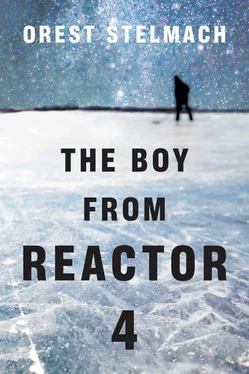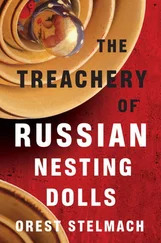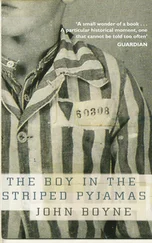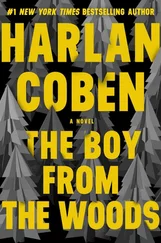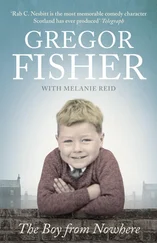Karel and Nadia sat at a beaten, bruised wooden table. Oksana lit a fire under a teakettle and prepared plates of food.
Nadia eyed her preparations with dread. “Where do they get their food?” she whispered.
“They grow it themselves,” Karel said. “They have all the land they want, and it’s very fertile.”
“How can it be safe?”
“Radiation doesn’t spread evenly. One lot may be cool, the one beside it hot. Avoid the mushrooms, the fruit, and the fish, and you’ll be fine. Don’t talk about it, and you’ll be fine. But if you keep asking questions…”
“That’s what people keep telling me. So, how did you come to be in Chernobyl, Karel? Were you born nearby?”
“More questions.” Karel said, but he didn’t seem to mind. “I was a college student conducting field studies here when the reactor exploded. I stayed to study animal behavior in the event of a nuclear catastrophe. Who can refuse the cutting edge?”
“Indeed,” Nadia said.
“My head hurt, my mouth was dry, and I walked around like a drunk for a month. But I stayed—for science, for my country, and to get my research published. Now I live on one lung with a pulmonary disorder. I can’t walk half a kilometer without fainting.”
Nadia wondered what her life would be like if her father had never escaped to America and had ended up in Chernobyl. She cringed and thought of the boy. How could he have survived eating the local food? Hell, how could he have survived, period? What kept him going?
Karel pulled a small booklet out of his pocket. “Dosimetric passport. The Division of Nervous Pathologies in Kyiv keeps track of the radiation in my body. Another fifty rem on my passport and I will go from Level One Disabled to Level Three Sufferer. You must prove you are a sufferer or a prospective invalid of Chernobyl to get help from the State. And it is very difficult to do. Otherwise, we are like American capitalists now. You are on your own.”
“Some people say the worst is to be healthy here,” Oksana said, placing a ceramic pitcher of liquid beside the three plates of food on the table. She sat down. “They are used to the state taking care of them. Me, I just want to live in my home. I lived through World War II as a child. I’ll take my chances against the silent enemy. Now, please eat, you two.”
Nadia knew it was a Ukrainian custom for the host to offer her guest the best food in the house. The bread, cheese, hard-boiled eggs, and pickled vegetables on the plates were veritable delicacies in a black village of Chernobyl. To not sample them—let alone not gorge herself on them—would be a great insult. Yet the same food could kill her. What was she supposed to do?
“This is kvass ,” Oksana said, touching the pitcher. “You know kvass ?”
“Yes, I’ve had kvass ,” Nadia said. It was a nonalcoholic cider made from fermented rye and herbs. Sweet, tasty, and in this case, quite possibly lethal. “But I’m more hungry than thirsty. I would love some of this bread. May I?”
“Take, take,” Oksana said.
The center consisted of fresh rye, and the crust offered a tangy caraway kicker. It was as dense as five loaves of American bread condensed into one. It tasted, she recalled her father saying long ago, “like food one could happily live on.”
“This is the best bread I’ve ever had,” Nadia said.
Oksana beamed.
Karel stuffed his mouth with egg, bread, and pickled mushrooms. “Mmm,” he said, winking at Nadia. “Delicious. You should try everything.”
Nadia ignored him and asked Oksana, “Did you live in this house before the explosion?”
“I was born here. This was my mother’s home, and my grandmother’s before her. My husband was an electrician at the power station. When Unit Four exploded, he became a dosimetric scout. He walked along the rooftop of the reactor with a dosimeter to measure the radiation levels for the bio-robots who were cleaning up. To help guide them to the cooler spots as the wind changed. He died five years later. In 1991.”
“Babushka is a famous figure in Chernobyl history,” Karel said while chewing. “There is no record of her courage, but those who know her will never forget. Tell her, Babushka.”
She dismissed him with a wave of her hand. “Eh. Who wants to hear about old people?”
“Tell her, Babushka.”
“Please,” Nadia said.
Oksana pursed her lips, sighed, and looked out a window. “They came from Kyiv on the fifth day. The government hired them. They were experienced hunters, the best the government could find. They came with orders to kill on sight. To exterminate. And when they got here, the shooting began right away.”
Nadia sat up. “What? They shot people? I’ve never heard of this. They shot their own people?”
“No,” Oksana said. “To many of us, it would have been better if they had shot people. Government people. No, the hunters didn’t come for the people. They came for the pets.”
Nadia processed the words. “The pets.”
“The wind carried nuclear dust,” Oksana said. “It was white like snow, but it wouldn’t melt. The snow would not melt. It came in through the windows, the chimneys, under the doors, through tiny holes in the walls. It landed everywhere.”
“Including fur,” Nadia said.
“I would hear gunshots and then a woman wailing. Once, I saw a man with a bottle of vodka throw himself under a tank to try to kill himself because his dog was the only friend he had. Trucks overflowed with dead dogs and cats… They bulldozed them with the cows.”
Karel placed his fork on his plate. “It had to be done. They were radioactive.”
“One pair of hunters,” Oksana said, “they were not well. They went into a home with a machete. They butchered the animals. It happened once. It happened twice.” Her eyes smoldered. “When I finally heard about it, I invited them here for some vodka. While they were drinking, I stole their guns. I put a Kalashnikov to one of their heads and told them to leave Chernobyl or they would be buried with the animals. It did not happen a third time.”
While the images flashed before Nadia, the table turned silent. Karel and Oksana bowed their heads. Nadia did the same.
“The best way to deal with people you want to get rid of is to invite them into your home first,” Oksana said. “That way, if you need to, you can kill them and bury them in your root cellar, where the militia won’t find them. Where no one will ever find them.”
Nadia looked up at Oksana in shock. Lines sprang from the babushka’s weathered face. Karel kept his head bowed. No one said anything.
A moan from beyond the kitchen. Karel and Oksana looked up.
A faded voice followed.
“Syanya.”
Syanya. The nickname for Oksana.
“He’s up,” Oksana said. “He’s calling for me. He heard us. He is probably hoping you are here. Let me see to him.”
Karel resumed feasting.
Oksana returned a moment later. “Come. He wants to see you. He comes in and out quickly these days. So you won’t have long to talk. The morning will still be better.”
Nadia followed Oksana down the short hall and almost stepped on her heels from behind. The air smelled of liniment. Oksana stopped at the doorway and motioned with her arm for Nadia to go inside. The shadow of a lit candle flickered on the door. Nadia hesitated.
“Please. There is no reason to be scared. You are with your uncle now. He is your family.”
Nadia stepped inside. A man lay wrapped in blankets on a narrow bed. Judging by the length of the bed, he was just a little over five feet tall. His cheeks were sunken and his skin discolored yellow. Red burn marks covered his face. This was the notorious Damian? This was the legendary thief? She felt a pang of disappointment. He looked more like a friendly farmer who’d fallen ill.
Читать дальше
